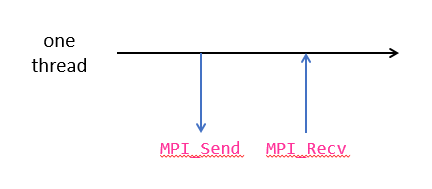Single-Threaded MPI
When the thread support level is MPI_THREAD_SINGLE, each MPI task runs only on a single thread, as shown.
Question: Is the program that follows an example of single-threaded MPI? Notice that all the MPI calls appear outside of the OpenMP parallel-for loop; no message passing is performed in the loop.

each MPI task has a single thread—no multithreading
The answer really depends on how the code is compiled. If it is compiled without -qopenmp (Intel) or -fopenmp (GCC), then the OpenMP parallel for directive is ignored, and the program is essentially equivalent to a non-hybrid, single-threaded, MPI-only code. In that case, it is fine to call MPI_Init() at the beginning of the program, rather than MPI_Init_thread(). The level of thread support will be MPI_THREAD_SINGLE, which is completely appropriate if OpenMP is not activated.
However, if the program is compiled with an OpenMP option, then the above example is erroneous. MPI_Init_thread() should be called instead of MPI_Init(). The required level of thread support should be MPI_THREAD_FUNNELED, one step up from MPI_THREAD_SINGLE. Overall, we are looking at a potential bug in the code, which needs to be removed by initializing MPI with a call to MPI_Init_thread(...MPI_THREAD_FUNNELED,...), in order to ensure correctness when OpenMP is enabled. The code should exit if the initialization call returns pvd=MPI_THREAD_SINGLE.
CVW material development is supported by NSF OAC awards 1854828, 2321040, 2323116 (UT Austin) and 2005506 (Indiana University)